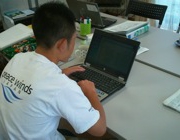The Power of Preparedness – A story from Pakistan
In my trip to Pakistan earlier this year, I learned first hand about the power of preparedness at the community level. I visited a small “displaced” village on the banks of the Indus River. I asked them if there had been any early warning system in place for the floods. What they told me was that they had listened to radios to hear news about the flooding as it made its way down south. They had also received phone calls from relatives and friends up north telling them about the scale of the flooding.
But what really caught my interest was the fact that earlier in the year, one of the local NGOs that worked as an implementation for our NetHope member had visited this village to provide disaster risk reduction training to the people. They had explained the basics of disaster preparedness by showing a video on a laptop computer.
The local NGO then told me that they could see a dramatic difference between the villages that had received the training versus the ones that had not. In the ones that had received the training, people had brought their valuables to higher ground before the flood waters started rising. They had also in some cases harvested their crops before they were ruined by the floods.
Just providing this short and simple awareness building at the local level can really make a difference in how people prepare for the floods. And technology can help in this as the story shows. It is much more effective to be able to show a video than to bring leaflets or simply speak to people. Having the ability to bring something like a laptop with a pre-loaded video allows for even remote villages to be visited.
Of course we can say that the early warning system was very limited in Pakistan, but as always people find ways if they are aware of the danger. They reach out to their friends and relatives living up-stream to form their own little advisory network.
Way too many early warning systems are based on the pre-tense that there needs to be large investment by the government and that the government needs to warn everyone.
But as social networks such as Twitter and FaceBook are showing us then it is about the community of people you know and the community you live in. We must find simple and cost-effective ways of helping people connect to those around them through the technologies they have and thereby amplify these people-based networks of early warning.
This week I will be attending the Global Platform for Disaster Risk Reduction and I look forward to meeting people from around the world and from organizations working on preparedness activities. For updates from the conference follow the Twitter tag #gpdrr2011





































